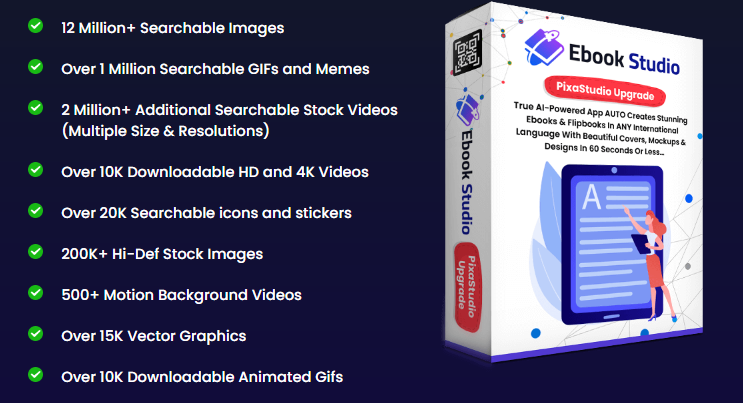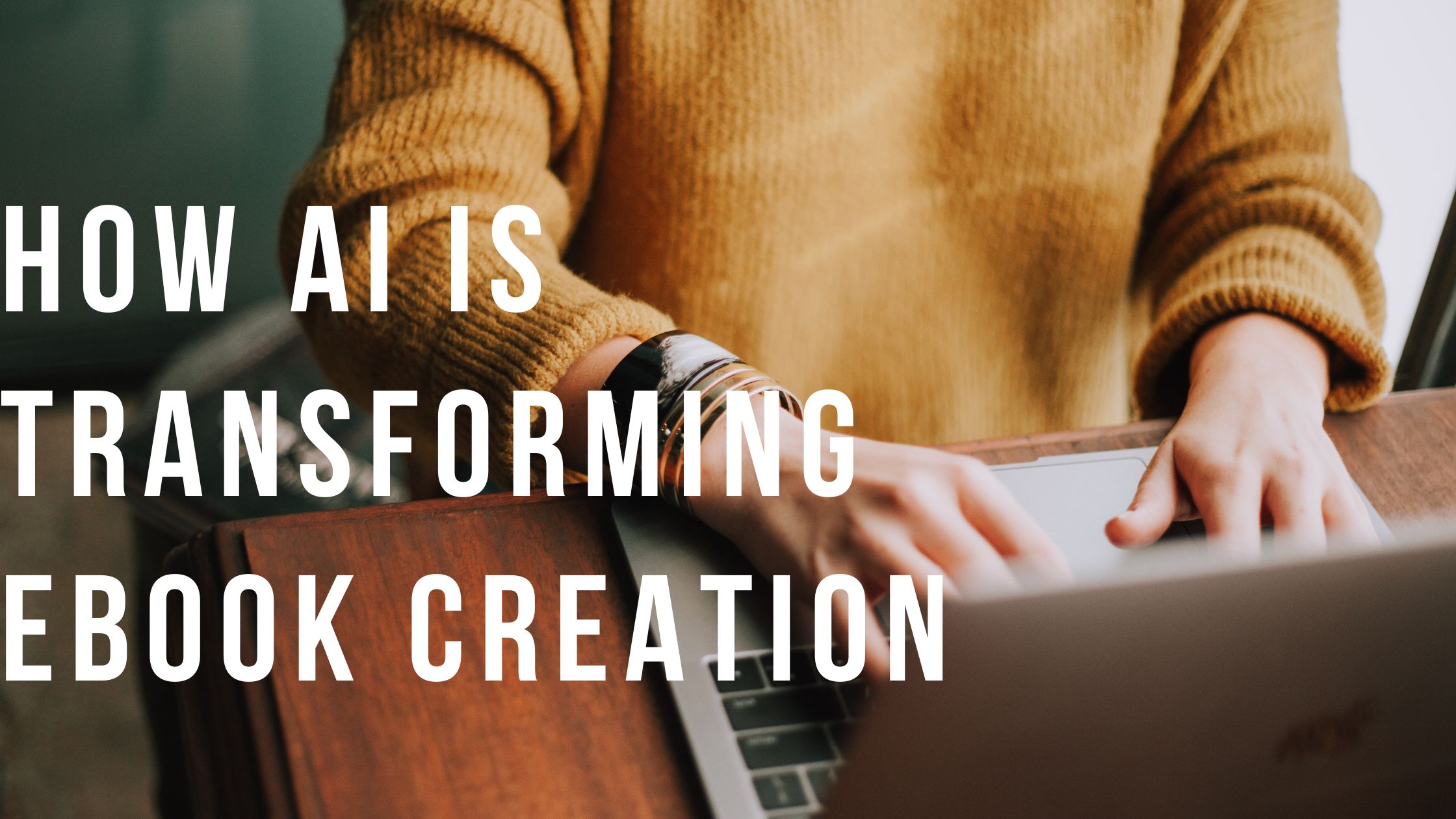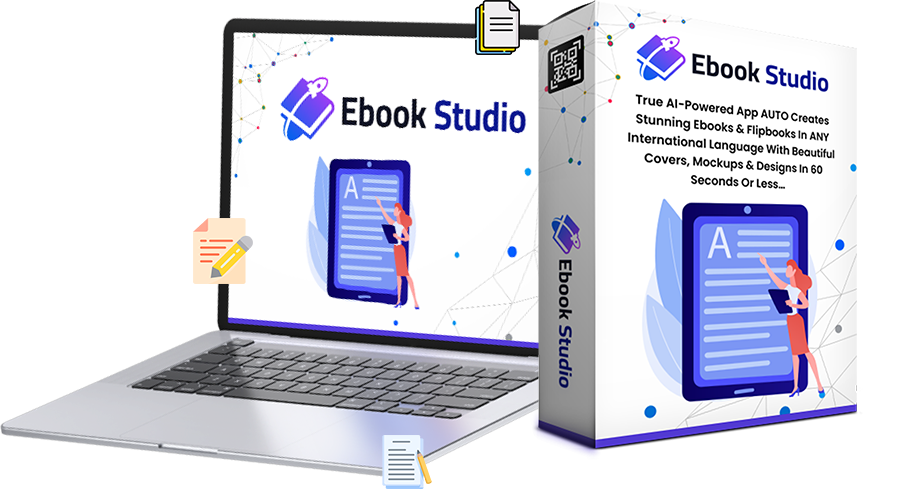The ebook industry has been rapidly growing in recent years, with more and more readers turning to digital books. The convenience of being able to carry hundreds of books in one device, ccess to a wide range of titles. They are also cost-effectiveness are just a few of the factors driving the ebook industry’s growth.
As the ebook industry continues to evolve, one of the most significant technological advancements is the integration of artificial intelligence (AI) into ebook creation. AI technology is being utilized in various aspects of the ebook industry, including cover design, content creation, and marketing.
The use of AI is transforming the way ebooks are created, published, and marketed, making the process faster, more efficient, and cost-effective. In this article, we will delve deeper into how AI is transforming the ebook industry and its various aspects.
Creating Ebooks
The traditional ebook creation process involves several steps, including writing and editing the manuscript, formatting the manuscript for ebook conversion, converting the manuscript to ebook format, designing and creating the ebook cover, and publishing the ebook. This process can be time-consuming and complex, requiring a range of technical skills and tools.
How AI is transforming the ebook creation process
AI is transforming the ebook creation process by providing new tools and techniques for creating, formatting, and publishing ebooks. One example of an AI-powered ebook creation tool is Vellum, a software that automatically formats ebooks based on user input. Vellum can create ebooks that are optimized for different devices and reading platforms, making it easier to publish high-quality ebooks.
Another example of an AI-powered ebook creation tool is Canva, a graphic design software that includes features for creating ebook covers and other promotional materials. Canva uses AI algorithms to suggest designs and layouts based on user input, making it easier to create professional-looking ebook covers and promotional materials.
Advantages of using AI for ebook creation
Using AI for ebook creation offers several advantages over traditional methods.
- Firstly, AI-powered ebook creation tools can save time and effort by automating tasks such as formatting, conversion, and cover design. This can help authors and publishers to focus on the creative aspects of ebook creation, such as writing and editing, rather than technical tasks.
- Secondly, AI-powered ebook creation tools can improve the quality and consistency of ebooks by optimizing formatting and design elements. This can help to create ebooks that are visually appealing and easy to read, improving the overall reading experience.
- Finally, using AI-powered ebook creation tools can help to reduce costs by eliminating the need for specialized technical skills or hiring external contractors for tasks such as formatting and design. This can make ebook creation more accessible and affordable for independent authors and small publishers.
AI is transforming the ebook creation process by providing new tools and techniques for creating, formatting, and publishing high-quality ebooks. By automating tasks, optimizing formatting, and improving design elements, AI is making it easier and more affordable to create professional-looking ebooks that are optimized for different devices and reading platforms, improving the overall reading experience for users.

Ebook Cover Design
Traditional cover design process
In traditional publishing, creating an eye-catching book cover is an important aspect of the book’s marketing strategy. The cover is the first thing that readers see and can make or break a book’s success. The traditional cover design process involves hiring a graphic designer or illustrator, providing them with a brief, and working with them to create a visually appealing cover design. The process can be time-consuming and expensive, with multiple revisions required before a final design is agreed upon.
AI-assisted cover design process
The integration of AI technology has revolutionized the cover design process. AI-assisted cover design involves using algorithms and machine learning to create book covers automatically. The AI software can analyze the book’s genre, tone, and target audience and generate designs that are tailored to meet those specific requirements. AI-assisted design tools can also create multiple cover options, reducing the time and cost involved in the traditional design process.
Moreover, AI-assisted cover design can help publishers and authors to A/B test their cover designs to find the one that resonates best with their target audience. With the use of data and analytics, AI technology can analyze how well a cover design is performing. This allows publishers and authors to optimize their designs for maximum impact.
Flipbook
A digital flipbook is a digital publication that simulates the experience of flipping through a physical book. It is a type of ebook that is designed to be interactive, engaging, and visually appealing. Digital flipbooks can be used to present a variety of content, including magazines, brochures, catalogs, and more. They are typically created in HTML5 or Flash format and can be viewed on a range of devices, including desktops, laptops, tablets, and smartphones.
Examples of digital flipbooks created using AI
AI technology is increasingly being used to create digital flipbooks that are visually stunning, engaging, and interactive. Some example is the AI-powered flipbook creators are:
- FlippingBook: This uses AI algorithms to create interactive and animated flipbooks from existing PDFs or other digital documents. The software analyzes the content and structure of the document and then automatically generates a flipbook with page-flipping animations, embedded multimedia, and other interactive features.
- Ceros: which enables marketers to create visually stunning digital experiences, including flipbooks. Ceros uses AI algorithms to analyze customer data and preferences, allowing marketers to create personalized flipbooks that are tailored to their target audience.
Advantages of using AI to create flipbooks
Using AI to create digital flipbooks offers several advantages over traditional methods. Firstly, AI-powered flipbook creation is faster and more cost-effective than manual design. Secondly, AI can analyze customer data and preferences, enabling marketers to create personalized flipbooks that are more engaging and effective. Thirdly, AI-powered flipbooks are often more interactive and visually appealing than traditional flipbooks, helping to improve customer engagement and satisfaction.
Ebook Writing Software
Ebook writing software is a type of software designed to assist writers in creating, formatting, and publishing ebooks. This software can provide a range of features, including editing tools, formatting options, collaboration tools, and publishing options. There are numerous ebook writing software options available in the market, including Scrivener, Ulysses, Microsoft Word, Google Docs, and more.
AI-powered writing tools
AI-powered writing tools are a relatively new addition to the ebook writing software market. These tools use machine learning algorithms to analyze and improve the quality of writing. They can provide features such as automated proofreading, grammar checking, and suggestions for word choices, phrasing, and sentence structure.
One example of an AI-powered writing tool is Grammarly. Grammarly is an automated writing assistant that can help writers to improve their writing skills by detecting errors and providing suggestions for improvement. Another example is ProWritingAid, which offers a range of writing analysis and improvement features, including suggestions for sentence structure, word choice, and clarity.
Benefits of using AI-powered writing tools
There are several benefits to using AI-powered writing tools for ebook creation.
- Firstly, these tools can save time and effort by automatically detecting and correcting errors in writing.
- Secondly, they can help writers to improve their writing skills by providing feedback and suggestions for improvement.
- Thirdly, AI-powered writing tools can help to ensure consistency in writing style and formatting, making it easier to create a professional-looking ebook.
- Finally, using AI-powered writing tools can help to improve the overall quality of the ebook, making it more engaging and appealing to readers.
AI-powered writing tools offer a range of benefits for writers and publishers looking to create high-quality ebooks. By using these tools, writers can save time and effort, improve their writing skills, and create more engaging and appealing content. As AI technology continues to evolve, we can expect to see more sophisticated and powerful writing tools that further enhance the ebook creation process.
EPUB Creator
EPUB (Electronic Publication) is a widely-used file format for ebooks that is designed to be flexible and compatible with a range of devices.. The EPUB format is based on open standards and uses HTML, CSS, and XML. This help to create a structured and reflowable document. This type can be optimized for different devices and screen sizes.
Traditional EPUB creation process
The traditional EPUB creation process involves several steps, including creating the manuscript in a word processing program, converting the manuscript to HTML format, creating a table of contents, adding metadata, and optimizing the formatting for different devices. This process can be time-consuming and complex, requiring a range of technical skills and tools.
How AI is improving the EPUB creation process
AI is transforming the EPUB creation process by providing new tools and techniques for creating, optimizing, and publishing EPUB ebooks. One example of an AI-powered EPUB creation tool is Calibre, an open-source ebook management software that includes features for converting and editing EPUB files. Calibre uses AI algorithms to optimize the formatting of EPUB files for different devices and reading platforms, making it easier to create and distribute high-quality ebooks.
Another example of an AI-powered EPUB creation tool is QuarkXPress. This is a desktop publishing software that includes features for creating and publishing EPUB files. QuarkXPress uses AI algorithms to analyze and optimize the layout and formatting of EPUB files. This ensures that they are optimized for different devices and screen sizes.
In addition to these tools, AI is also being used to automate and streamline the EPUB creation process. This helps in reducing the time and effort required to create and publish ebooks. By automating tasks such as formatting, metadata creation, and file conversion, AI is making it easier and faster to create high-quality EPUB ebooks that can be optimized for different devices and reading platforms.
AI is transforming the EPUB creation process by providing new tools and techniques for creating, optimizing, and publishing high-quality ebooks. By automating tasks and optimizing formatting, AI is making it easier and faster to create EPUB ebooks that are optimized for different devices and reading platforms, improving the overall reading experience for users.
Future outlook for the ebook industry with AI technology.
The future of the ebook industry looks bright with the integration of AI technology. AI is continually improving, and with further advancements, we can expect more efficient, accurate, and affordable tools for ebook creation and publishing. With the integration of AI-powered virtual assistants, chatbots, and voice technologies, authors and publishers will be able to provide personalized and interactive experiences to their readers.
AI-powered tools and techniques have made it easier and more accessible for independent authors and small publishers to enter the market. We can also expect more diverse and innovative ebook content in the future.
Frequently Asked Questions (FAQs) About Using Ai In Ebook Creation And Publishing
Q: How does AI assist in ebook cover design?
A: AI analyzes book genre, target audience, and content to generate visually appealing cover designs automatically.
Q: What are the advantages of using AI-powered writing tools for ebook creation?
A: AI-powered writing tools help with automated proofreading, grammar checking, and provide suggestions for improving writing quality and clarity.
Q: How can AI improve the EPUB creation process?
A: AI can optimize formatting, analyze layout, and ensure compatibility across different devices, making EPUB creation faster and more efficient.
Q: What benefits does AI bring to overall ebook creation and publishing?
A: AI saves time and effort, improves quality and consistency, reduces costs. This makes ebook creation and publishing more accessible for authors and publishers.
Q: What does the future hold for AI in the ebook industry?
A: The future looks promising. With AI advancements enabling personalized reading experiences, innovative content creation, and enhanced interactions between authors and readers.
Conclusion
AI is transforming the ebook industry in several ways. AI-powered tools and techniques are improving the quality, consistency, and affordability of ebook creation and publishing. AI-assisted cover design, flipbook creation, ebook writing software, EPUB creators, and ebook creation tools offer several benefits such as saving time and effort, improving the overall quality and consistency, and reducing costs.
In conclusion, the ebook industry is rapidly evolving with the integration of AI technology. With more efficient and affordable tools for ebook creation and publishing. We can expect the industry to grow and become more diverse, providing readers with personalized and interactive experiences. As AI technology continues to evolve, we can look forward to more advancements and innovations in the ebook industry in the years to come.





